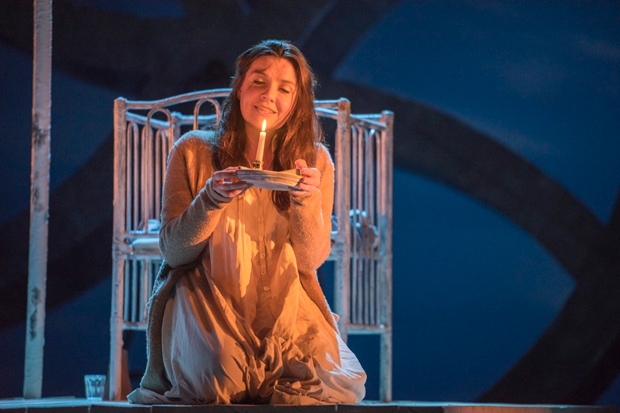What’s the best first opera for a sceptical adult first timer? It’s a favourite topic among opera buffs, and once you get past the assumption that novices need to be spoon-fed familiar tunes, the consensus — slightly surprisingly — often settles on Jenufa. Surprisingly? Well, yes: Janacek still isn’t guaranteed box office (maybe people conflate that spiky Czech name with a mental picture of Eastern bloc bleakness). In fact, this is a piece that can upend every lazy prejudice about the form: a concentrated plot, a concise running time, and no heroes or villains, just believable characters with painfully human failings. And all set to music that never judges, never sentimentalises: simply cuts raw and direct to the heart. Performed even moderately well, it can turn you inside out.
Richard Studer’s new production at Longborough is performed a lot more than just moderately well. Beautiful singing alone isn’t enough for Jenufa, though all four of Longborough’s central quartet delivered moments of soaring radiance as and when plot and character demanded it. You need to glimpse, at least, what Jenufa (Lee Bisset) sees in her loutish fiancé Steva, and Andrew Rees’s tenor is certainly seductive. Just as Gaynor Keeble, as the Kostelnicka, can deliver Valkyrie-like blasts of tone — or screech like a bird of prey. That’s all basic stuff for Jenufa.
Yet one moment among many that struck home in Studer’s production was their exchange in Act 2, as the Kostelnicka pleads with Steva to do the honourable thing by Jenufa and their illegitimate baby. As he squirmed and finally fled, that ingratiating voice of Rees’s curdled and hardened, even as Keeble’s initially steely mezzo softened, sweetened and for one quiet, heart-stopping moment — as Steva’s self-pitying tears actually seemed to unlock the Kostelnicka’s latent empathy — melted. Keeble makes a more youthful Kostelnicka than you tend to see, which made her disintegration in Act 3 all the more shocking. As she embraced her stepdaughter Jenufa for the last time, her gimlet stare gave way to wide-eyed vulnerability: their roles reversed. If Keeble’s portrayal had occasionally edged towards melodrama, this was devastating.
And that’s without even mentioning Bisset’s extended, understated portrayal of a young woman slowly freezing inside with grief (with singing as focused and as subtle as her recent Sieglinde for Opera North was heroic); or Daniel Norman’s Laca, whose journey from resentful outsider, face poisoned with envy, to redemptive source of damaged but genuine love made the pair’s final scene intensely moving. Studer’s spartan, sepia-toned designs — the stage was almost bare apart from a symbolically spinning millwheel (shades of Carousel) — kept the focus on the story.
Not that Longborough’s pocket-sized opera house permits much more. But that’s its strength. It’s all about the drama: there simply isn’t room for anything else. With an orchestra pit that’s modelled on Bayreuth, conductor Jonathan Lyness was able to let his 42 players tear into Janacek’s score without any risk of overwhelming the singers. The result was a Jenufa on full beam, emotionally and dramatically, the occasional rough edge in the orchestra only heightening the immediacy. God knows, there’d be no worse betrayal of this music than a slick performance. Jenufa demands honesty, and on that score, Longborough is uncompromising.
At Opera Holland Park, meanwhile, they take Rossini’s La Cenerentola exactly as seriously as it deserves. The downtrodden heroine is called Angelina, while her snobbish stepfather is called Don Magnifico: that’s the level of subtlety we’re dealing with here. Despite a truly heroic bit of special pleading in the programme book, this certainly isn’t Le nozze di Figaro.
Oliver Platt’s direction majors on wit and charm, and Neil Irish’s designs — regency hunting pinks for Prince Ramiro’s retinue, and a reversible set that flipped from Magnifico’s seedy apartments to the mirrored hall of the royal palace — deftly sketched the social standing of the various characters. To animate them, we had lively singing from a nicely matched cast. Nicholas Lester was a dapper and convincingly regal Dandini, Victoria Simmonds an unusually feisty Angelina, and Jonathan Veira, as Magnifico, cheerfully ran away with his every scene: blustering, rolling his eyes and smirking with gluttonous satisfaction as he fantasised about chickens and sturgeons (this has got to be the gourmet Rossini’s most food-obsessed opera).
Dane Lam conducted with style and swing, and even found some real emotional gravity in the few brief scenes devoted to the opera’s most intriguing character by a mile, the philosopher Alidoro (Barnaby Rea). Somehow, though, the show didn’t quite make the leap between the stage and a noticeably unresponsive audience. Possibly OHP’s open-sided theatre diffused its energy? It’s hard to say: the essentials are sound, and in a more intimate venue, this Cenerentola would surely fizz. Instead, what might have been Pol Roger ended up as Waitrose Prosecco. Though on a warm night in Notting Hill, that’s certainly pleasant enough.






Comments